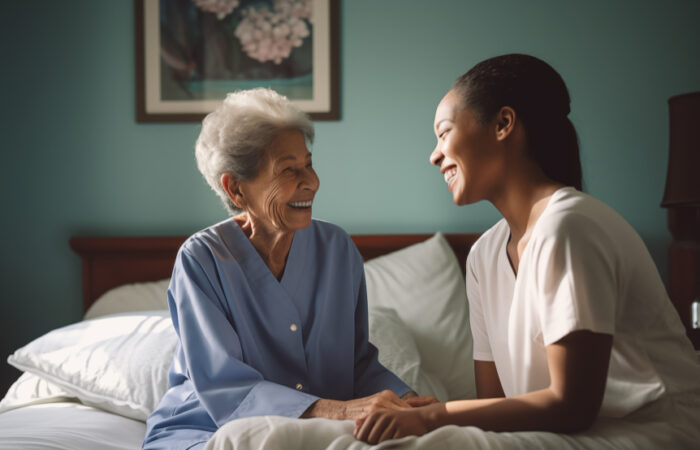
7 Effective Strategies for In-Home Caregivers and Seniors to Manage Anxiety
New findings have revealed the growing number of Americans facing anxiety and depression, with approximately 20 million individuals affected by these mental health conditions. The causes behind this issue are diverse.
Regrettably, caregivers are especially susceptible to experiencing anxiety compared to the average person. Caregivers often invest substantial emotional and physical effort while tending to their loved ones. Therefore, it is crucial to address this matter and discover ways to assist caregivers in managing their anxiety while caring for older adults.
Being responsible for the welfare of an aging individual who heavily depends on you can be immensely draining, even for the most resilient individuals. As a result, caregivers may gradually struggle with anxiety, which can manifest as bursts of anger, sadness, isolation, and a constant state of exhaustion.
Unfortunately, caregivers’ anxiety and depression have become an unnoticed health crisis. Reports indicate that over twenty percent of caregivers are presently grappling with anxiety, highlighting the importance of urgently addressing this issue.
The Leading Causes of Anxiety for Caregivers
As a caregiver, you are responsible for ensuring that your loved ones, especially seniors, have a comfortable life. However, caring for them can be overwhelming, impacting your sleep, energy, and personal life.
The stress and pressure of caregiving can lead to fear and uncertainty about your loved one’s physical, emotional, and financial well-being. These emotions may develop into anxiety if not managed on time, eventually leading to depression.
Caregiving can also cause a shift in your emotions and roles, leading to anger, frustration, exhaustion, sadness, and loneliness. To help you cope with anxiety, our team has developed proven strategies that can help you lead a mentally and physically stable life.
Common Causes of Increased Anxiety in Seniors
As per the American Association for Geriatric Psychiatry. 10-20% of older adults experience anxiety. This condition can harm their daily life. However, there are several common causes of increased anxiety among seniors:
- Frequent Worries About Being Reliant on Others: Older adults may experience anxiety due to concerns about becoming dependent on others for their daily activities and needs.
- High Cost of Medical Care: Seniors, particularly those with fixed incomes or limited financial resources, often experience anxiety due to the considerable financial stress caused by medical expenses.
- Grief: Seniors may experience intense anxiety following the death of a loved one as they go through the grieving process and adapt to life without their significant other.
- Severe Side Effects From Medications: Medications commonly prescribed to seniors for various health conditions may have side effects that can cause or exacerbate anxiety symptoms.
- Separation and Loneliness: Seniors who find themselves socially isolated or experiencing a loss of social connections could face a greater risk of developing anxiety. Feelings of loneliness and a lack of support can significantly increase seniors’ anxiety levels.
- Limited Mobility: Physical limitations or a decline in mobility can lead to frustration and anxiety, as seniors may struggle with their independence and fear losing their ability to perform everyday tasks.
- Chronic Health Conditions: Seniors with chronic illnesses, such as arthritis pain or diabetes, often experience higher anxiety levels. The physical and emotional impact of these conditions can contribute to anxiety symptoms.
Signs of Anxiety in Caregivers and Seniors
It’s important to remember that anxiety signs and symptoms can vary from person to person. Here are some of the common behavioral and mental signs of anxiety that you may experience:
- Overwhelming feelings of panic and fear
- Compulsive thoughts or beliefs
- Disproportional response to triggering fears
- Nervousness
- Feelings of agitation
- Loss of focus due to troubled memory
- Sleeping disorders (too much sleep or getting too little)
- Hallucinations
- Loss of interest in activities you once enjoyed
- Frequent bouts of fatigue
- Changes in weight (gain or loss)
- Alcohol or drug abuse, including misuse of prescription drugs
If you are a caregiver or older adult experiencing anxiety, you may also experience physical signs such as:
- Shortness of breath
- Fast heartbeats
- Hot flashes
- Shivers
- Headaches
- Dry mouth
- Frequent urination
- Nausea
- Extreme sweating
- Cold or sweaty hands
Strategies for Coping with Anxiety for Caregivers and Seniors
Anxiety can be incredibly challenging, affecting your daily activities and overall health. At Bena Home Care, we prioritize the well-being of caregivers and seniors, aiming to support them in leading fulfilling lives.
We recognize that caregiving’s emotional and physical burdens can be overwhelming, even for the most assertive individuals.
In light of this, our team has compiled seven effective strategies to help caregivers cope with anxiety:
1. Admit that You Need Help and Ask for it
Caring for someone can be overwhelming, and it’s normal to need assistance. Don’t feel like you’re burdening others when you ask for help. Recognizing your limitations and reaching out for support when necessary is essential.
Here are some steps you can take to seek assistance:
- Identify Your Needs: List specific areas where others can lend a hand. This could include helping walk the senior or loved one, caring for young children or family members, or running errands when you’re short on time.
- Reach Out to Your Network: Start by considering family members, close friends, or neighbors who may be willing to assist you. Don’t hesitate to ask for their help.
- Consider Professional Help: If you are consistently overwhelmed, consider exploring hiring in-house help. A caregiver can assist regularly to alleviate some of the burden.
- Explore Daycare Facilities: Additionally, you can explore daycare facilities specifically designed for seniors. This will give you a break from caregiving duties and allow your loved ones to engage in social activities.
- Seek Professional Support: If you’re experiencing anxiety or emotional distress, you must talk to your local physician. They can evaluate your situation and determine if medication or therapy sessions with a counselor would be beneficial.
2. Pay Close Attention to Your Ability to Provide Something
As a caregiver, it’s important to remember that nobody is perfect. While it’s natural sometimes to feel guilty about aspects of your role, it’s crucial to believe that you are always doing your best to provide the highest level of care and support to the senior or loved one you are responsible for.
One way to ensure that you can deliver on your responsibilities is by giving careful attention to what you can deliver. Take the time to assess your skills, capabilities, and limitations honestly. Understanding what you can and cannot do will help you to set clear boundaries and avoid overextending yourself.
It’s also important to communicate openly and honestly with the senior or loved one that you care about what you can and cannot provide. Managing expectations and preventing misunderstandings is crucial to avoiding disappointment or frustration.
By focusing on what you can deliver and clearly communicating your limitations, you can ensure that you provide the best care possible while taking care of yourself and your needs. Remember, caring for yourself is also essential to being an effective caregiver.
3. Attend a Local Support Group
Support groups are valuable resources that offer solace and empathy to caregivers like you. They provide a safe space for caregivers to find comfort and mutual understanding. These groups provide a serene environment where you can freely express your emotions and fears, knowing that others around you are going through similar caregiving challenges.
Support groups not only provide emotional and moral support, but they offer practical benefits as well. By joining a support group, you can learn new coping strategies and skills to overcome any anxieties you may have as a caregiver. These strategies help you navigate through the various challenges that may arise on your caregiving journey.
Another advantage of joining a support group is forming new friendships with people who genuinely understand what you are going through. The bond with fellow caregivers can be priceless, as they can provide empathy, advice, and encouragement. Sharing your experiences and actively hearing others’ stories can be significant and impactful to gain valuable insights and find inner resilience. This process allows you to understand different perspectives and realize you are not alone.
4. Setting Personal Realistic Goals and Managing Your Pace
To maximize your productivity and avoid burnout, it’s essential to prioritize your tasks and pace yourself effectively.
Follow these steps to stay on track:
- Prioritize One Task at a Time: Instead of trying to tackle a multitude of tasks all at once, it’s recommended to concentrate on one Task at a time. By doing so, you can devote your complete attention resulting in higher-quality work.
- Create a Daily Routine List: Formulating a daily routine list can help you stay organized and complete your tasks efficiently. To start, make a list of the most essential tasks that must be completed every day. Then, organize them based on their level of urgency and significance.
- Manage Your Energy Levels: Avoid draining your energy early in the day by minimizing activities requiring much effort or concentration. Save these tasks for later when you have more energy and focus. This way, you can allocate your energy effectively throughout the day and avoid feeling overwhelmed.
- Set Realistic Goals: Setting achievable goals within a specific time frame is crucial. By setting realistic goals, you’ll be able to accomplish more tasks without experiencing burnout or emotional outbursts.
Remember to:
- Break down more significant tasks into smaller, manageable steps
- This will make them more attainable and less overwhelming
5. Consider Respite Care
Looking after a family member can be challenging; that’s why respite care can be a helpful way for caregivers to take a break. Respite care is a temporary form of assistance that can give caregivers some relief and let them concentrate on their own lives without worrying about their duties for a while. Respite care can be given in places like daycare centers or facilities offering overnight stays.
6. Personal Health Objectives for Caregivers
As a caregiver, it’s essential to prioritize your mental and physical well-being. You can set personal health objectives to ensure you’re looking after yourself.
Consider the following goals:
- Establish a Sleep Routine: Create a schedule that allows you to get sufficient restorative sleep. Establishing a regular and steady sleep pattern will enable you to experience a sense of renewal and revitalization.
- Make Time for Exercise: Incorporate regular physical activity into your daily routine. Exercise or take refreshing walks to keep your body active and enhance your fitness.
- Adopt a Healthy Diet: Choose nourishing foods that provide essential nutrients. Maintaining optimal health and energy levels can be achieved by consuming a well-balanced diet.
7. Stay Connected
When you’re working around the clock as a caregiver, it’s easy to become isolated. That’s why staying connected with others who can provide support is essential.
Here are some tips:
- Look for caregiver resources in your area to learn more about available services.
- To seek support when you feel overwhelmed, try reaching out to the following people:
- Family members
- Friends
- Other loved ones
These individuals can offer valuable emotional support during difficult times.
Key Takeaway
Being a caregiver is a challenging role that can have a significant impact on your life, often leading to feelings of anxiety. It’s not uncommon for caregivers to experience anxiety disorders due to exhaustion and emotional strain. In some cases, these conditions may even require medical attention.
While it can be difficult to see your loved ones or older individuals suffer, there are strategies you can use to manage your anxiety and maintain a sense of balance in your own life. Taking care of yourself is essential, as it will give you the strength and energy to provide better care to your loved ones.
At Bena Home Care, we invite you to reach out to us without any hesitation. We take pride in introducing our dedicated squad of compassionate and skilled personal caregivers, registered nurses, and home health aides who form the backbone of our team. Every team member fully commits to serving families like yours with unwavering expertise and genuine care. Our team is composed of individuals who go above and beyond in their commitment to providing exceptional care. We understand that entrusting your loved ones to others can be a challenging decision. That’s why we ensure that our caregivers possess the compassion and skills necessary to meet the unique needs of each family we serve. While caring for others is undoubtedly essential, it’s equally vital that we prioritize self-care. As a caregiver, it’s easy to overlook your own well-being while providing care to others. However, we genuinely believe that in order to provide the best care possible, you need to take care of yourself as well. At Bena Home Care, we understand that your physical and emotional health should never be compromised.
With Bena Home Care, you can trust that you and your loved ones will receive nothing but the best care and support. Our team is dedicated to ensuring that each family we serve feels valued, respected, and cared for every step of the way. Don’t hesitate to reach out and connect with us today. Your journey to compassionate and skilled caregiving starts here.















